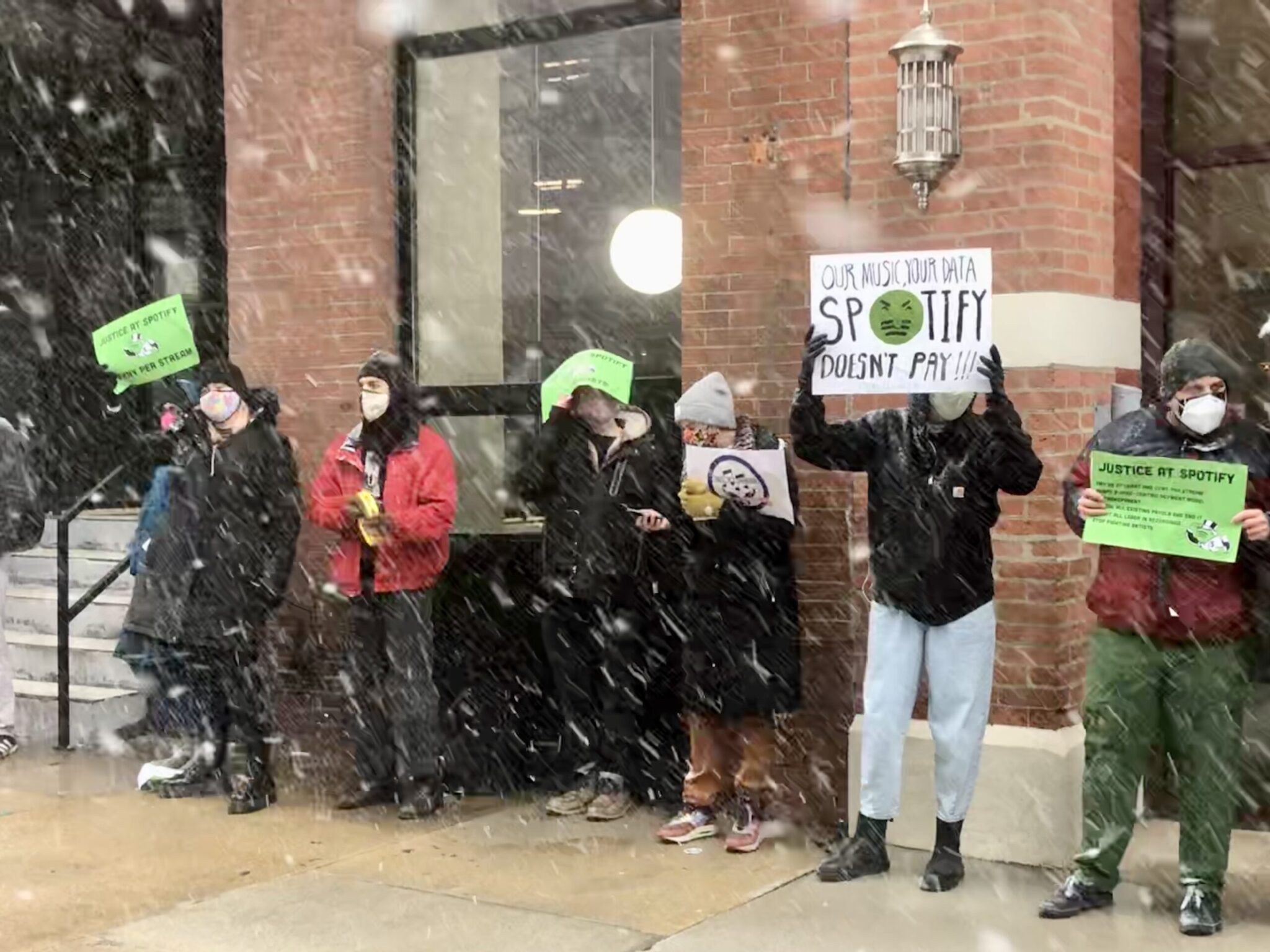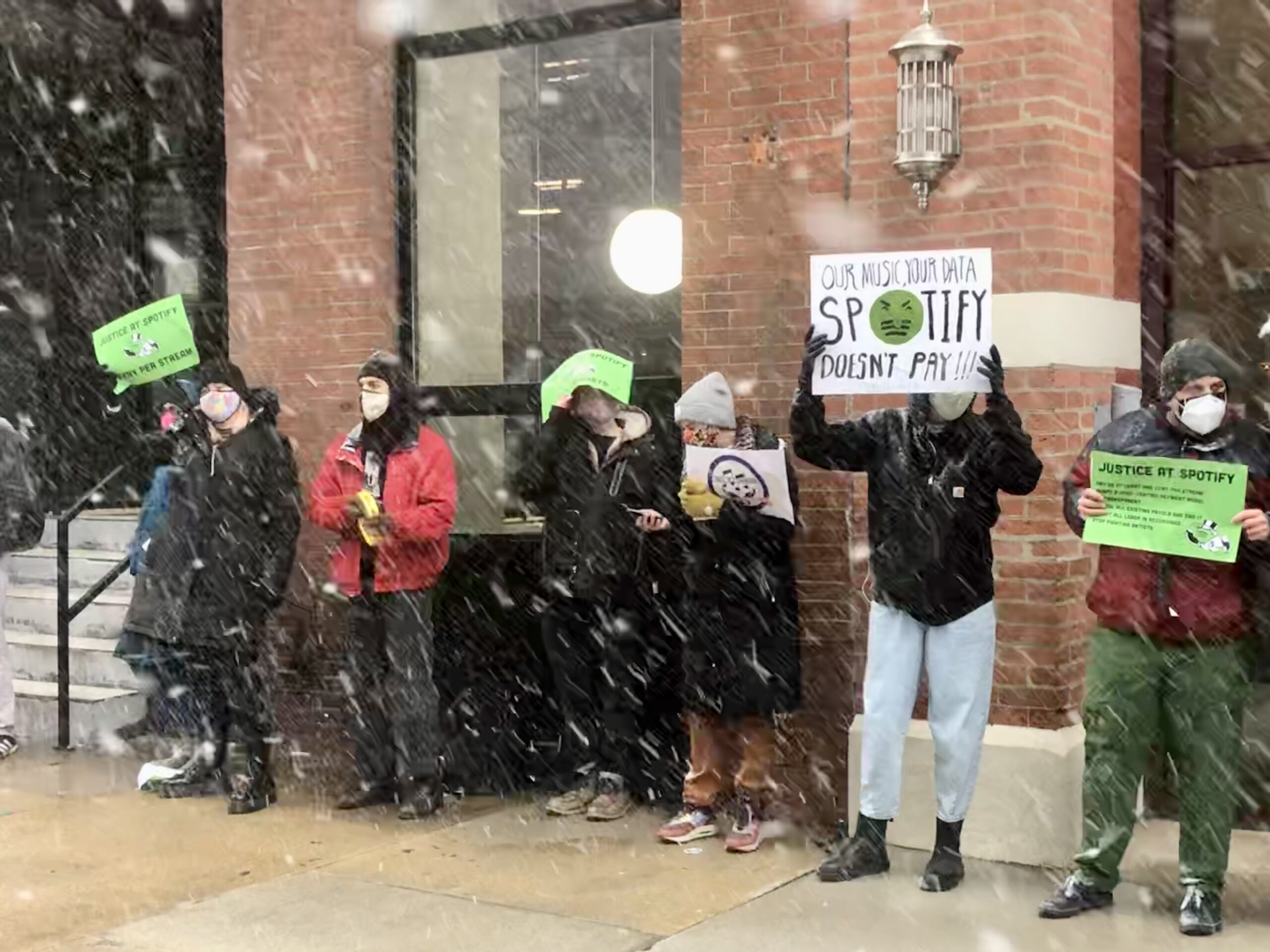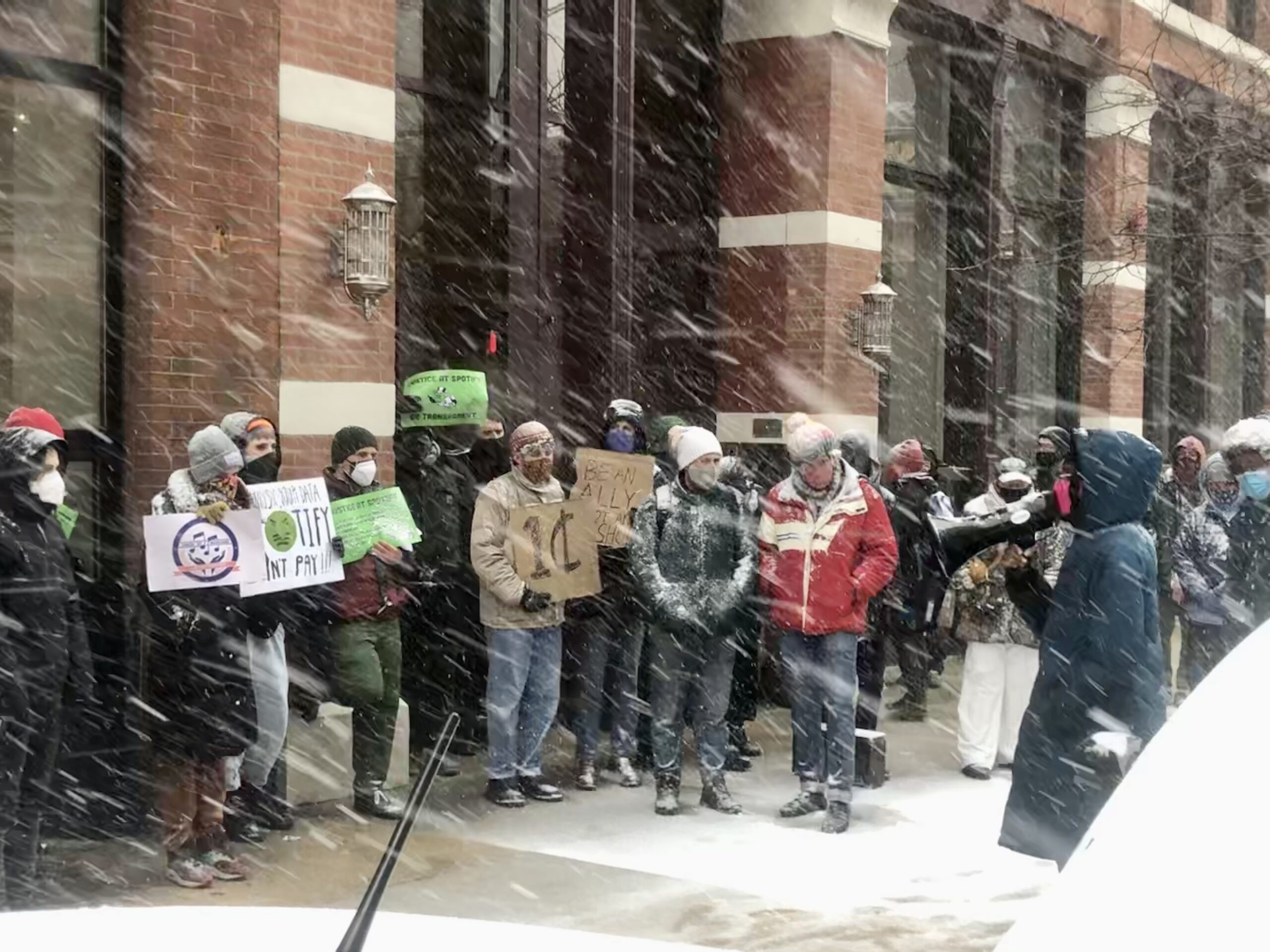

It’s fair to say Moontype wouldn’t have become what it is today, a full-fledged rock band, without the interconnectedness of Chicago’s music ecosystem. That, and the power of friendship.
The trio, made up of singer, songwriter and bass player Margaret McCarthy, guitarist Ben Cruz, and drummer Emerson Hunton, released its debut LP Bodies of Water on April 2. While the album is just a month old, its tracks date back to the group’s years at Oberlin College, where they were all students of the school’s music conservatory. Then, Moontype was the minimal, bass-driven recordings born in McCarthy’s bedroom—performed solo at intimate gatherings and DIY shows—while the would-be bandmates orbited each other’s respective friend groups.
It wasn’t until after graduation, and each member’s migration to Chicago between 2016 and 2018, that they were reacquainted and eventually joined forces musically. On Bodies of Water, songs originally imagined by one take on a robust new shape, with the gusto and confidence that can only come from knowing you’re all on the same page; that the folks at your sides have your back.
“It’s a little bit wild,” McCarthy laughed over the phone, the morning the album dropped. “Me, Ben and Emerson got together this morning just to be like ‘Yay, we did it!’”
The solidity of their bond is apparent from the shotgun blast of opening track “Anti-Divinity”—where the clang of guitar and drums take off at the same time as McCarthy’s tender vocals. Withstanding the rumbling wall of sound created by Hunton and Cruz, she’s embraced intensity this time around compared to the song’s early iteration heard on her solo effort, 2018’s self-released bass tunes, year 5.
The album also serves as a showcase for her curious, intimate, and intimately funny lyrics, depicting human connections in the throes of ever-changing surroundings and youthful restlessness. Subtle yet lucid, McCarthy spins narratives that are just as provocative as Cruz and Hunton’s instrumentation. Despite Moontype’s humble beginnings as a one-woman operation, the band standing today is wholly collaborative.
Breathing new life into each of the four tracks from bass tunes (including “About You,” “Alpha” and “Stuck on You”) in addition to eight, more recently composed numbers, that newfound rush is maintained across Bodies of Water. According to McCarthy, the three-piece’s exploration of indie rock – ranging from soft, sparse acoustics to more experimental, textured, math rock and soaring shoegaze – would’ve been impossible for her to find without her partners-in-crime. “They’re incredible musicians. They take [the music] to particular places and have influences and listen to things I don’t listen to. This really is our band, the songs become something they wouldn’t be otherwise,” she says.
“I wrote all the skeletons that are on the album. The lyrics are mine and the feels,” she jokes before continuing to celebrate the trio’s chemistry, “but it wouldn’t have been the same if this band had different members in it or if it was just me. I don’t think of [Moontype] as my project. We fell in together really quickly and easily. When Emerson joined the band, he literally just started playing along and I was like ‘Okay, thank you!’ It was so good.”
Initially expanding with just Cruz after reuniting in the Midwest, the duo invited Hunton to jam with the hopes his steady rhythms would help fortify the songs they’d been rehearsing. Playing with Hunton in the past, Cruz figured the drummer’s abilities would naturally fill the space between he and McCarthy’s back-and-forth on the strings.
Their perfect fit hasn’t gone unnoticed. In the months leading up to the album’s release, the band received high praise for lead single “Ferry” from The New York Times and NPR. Streams were bringing new fans and a bigger buzz. Noting the track’s lushness and balance of heavy and gentle, Moontype quickly became an act to keep your eye on and Bodies of Water, one of the year’s most highly anticipated releases.
With the band able to capture a noisier, more challenging sound as a whole, McCarthy credits Cruz and Hunton with inspiring her to dig into a more free-flowing, visceral expression vocally and musically – something that the projects she’d created in the past, geared more toward electro-pop, didn’t fully allow.
“I usually will write really late at night, playing kind of softly because I don’t want to bother my neighbors, and I’m singing in my room – it’s just kind of a quiet experience,” she recalls. “So many of the songs ended up becoming loud. There are plenty of bands that are way louder [than Moontype], but compared to me alone in my room, they feel loud and energetic. I think about ‘About You,’ where I was really in my feelings about this friendship when I wrote it. It was a very wordy song where I was just telling this story to myself, but when I play it with them I’m like, this is a rock song.”
Recorded at the end of 2019 at Chicago’s favored Jamdek Studios, the pandemic shutdowns and uprisings over the summer of 2020 after the murders of George Floyd and Breonna Taylor pushed activity on the album’s final touches to the backburner to refocus energies in support of the movement.
The year would’ve formally introduced Moontype beyond the city’s tightly-woven scene, with shows scheduled alongside the likes of Ohmme and others. Admittedly, fellow local acts informed the band’s evolving sound once recording sessions had begun. Fans as much as they are active participants in the scene, working at venues such as Constellation and Sleeping Village helped Moontype’s members establish a deeper understanding of the sense of community at its heart. Through that infectious camaraderie, the band found an ally in mastering engineer Greg Obis and a home on the label he co-founded with Deeper’s Kevin Fairbairn, Born Yesterday Records.
“I met Greg [Obis] working at Sleeping Village. He was mixing there and when I started working there I was the stage manager and running lights.” Obis believed in the band’s sound and, after mixing one of their live sets at beloved venue Hideout and seeing the crowd’s reaction, proposed they release with Born Yesterday.
“The three of us are all in other bands, too,” McCarthy adds, alluding to country outfit The Deals (which includes her, Cruz and Hunton among the “Deal family band”), “and everyone’s bandmates were coming to the shows. We wouldn’t be where we are now without all of those friends.”
The camaraderie and the community has “been so essential to really every part of my life here in Chicago. For this band, it’s definitely important,” McCarthy explains.
After an additional year of sitting on their finished material, the decision to finish the LP was unanimous, and the hype and kind words from the music press are everything a young band dreams of (minus the pandemic, which ultimately prevented Moontype from being able to do much with the recognition they’d received). As time passed, the album’s themes of longing took on new meanings to different listeners; revealing lockdown feelings of “separate but together” in song and lending a relatable, though unintentional, perspective on long-distance pandemic friendships.
“I tend to really attach songs that I write to the time when I wrote them and the people I was thinking about when I wrote them, so for me personally those songs are still very much attached to that,” she describes. “For someone who doesn’t have those associations, some – if not all – of these songs about friendships and feeling distant could feel really relevant.”
As for many songwriters hoping their lyrics will follow their listeners and change as they do, leaving room for others’ interpretation is part of the appeal for McCarthy. It’s helped keep the tracks on Bodies of Water fresh, while speaking to their universal appeal and the band’s promising sense of longevity.
“It’s been so long and I’ve listened to these songs so many times before. Now it’s just people hearing them for the first time. It feels really good, and I’m so grateful to all of the news outlets, but it is strange,” she confesses. “It’s a nice form of external validation; it just feels a little bit not real because it’s only online, it’s only on social media. We haven’t actually played a show in over a year, so it feels a little bit removed, you know what I mean?”
While live music’s survival has been challenged, Moontype – like many other artists – are looking forward to the possibilities of touring by the end of the year. Their first performance after Bodies of Water’s release was streamed live from Constellation on Saturday, April 3, and more virtual gigs are in the works. Though McCarthy stands as the trio’s chief songwriter, there’s heightened fervor in her voice when mentioning songs Cruz and Hunton have each composed for possible future release. New music, in general, reignites a spark in the conversation.
“We’ve been practicing only the songs on the record pretty much for the last couple months, and we’re so excited to start working on new songs,” she says. “Honestly, this spring is feeling like a really hopeful and exciting time. Spring in Chicago always feels exciting because everyone’s been inside all winter, but this year obviously – it’s a sign people are starting to get vaccinated; things are looking up pandemic-wise.”
With so many independent artists looking to make up for lost time, Moontype continues to take things in stride.
“I can’t imagine moving into a crowded space right now,” McCarthy adds, regarding the impending return of concerts in the city as COVID-19 restrictions loosen and summer approaches. “I feel like the first couple times might be a bit awkward, but it’ll only feel good to be playing for people again. I can’t wait for our first show with an actual audience. We’re looking forward to it. We’ll be ready.”
Follow Moontype on Instagram and Facebook for ongoing updates.




